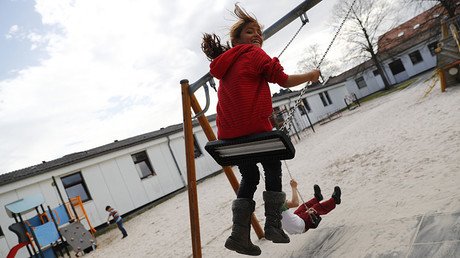43% of unaccompanied ‘underage’ migrants in Germany turn out to be adults – report

Some 43 percent of migrants in Germany who claim to be underage are actually adults, local media reports, citing official data. The figures for one of Germany’s major cities, Hamburg, are even higher.
Out of a total of 55,890 asylum seekers claiming to be under the age of 18 and being treated as such by German authorities, 24,116 were officially of adult age, Die Welt newspaper reported, citing the Federal Ministry of Family Affairs. The media outlet claimed the data was valid as of November 8.
In some German cities, the proportion of false “underage” migrants appears to be even higher. In 2016 in Hamburg, for example, 47 percent of 1,813 migrants claiming to be minors turned out to be legally of adult age, according to official statistics. The same pattern persisted this year, as 49 percent of newly arrived 485 “unaccompanied minors” were actually adults.
Those migrants who claim to be underage fall under the responsibility of the Child and Youth Emergency Service (KJND) – a local welfare service, existing in the majority of German communities. The KJND then assesses their claims, paying particular attention to those who do not have a passport or any other official documents.
If the social service suspects a “minor” may be an adult, it sends that person to a medical facility to determine an estimated age. The tests include X-rays, computed tomography, as well as other checks, namely evaluation of the jaw and finger bones, which can easily determine a person’s age.
READ MORE: Germany criticized by UNICEF over treatment of child refugees, after accepting 350,000
Other European countries have encountered similar problems with adult refugees claiming to be “unaccompanied minors.” In Denmark, as of December 2016, some 74 percent of “underage” asylum seekers turned out to be adults after a series of bone and teeth tests.
In Sweden, as of July 2017, over 80 percent of those “underage”migrants whose age raised questions with the authorities turned out to be adults. Only some three percent of 2,481 migrants who were tested in the country to determine their age were female, while the overwhelming majority of those pretending to be minors were young males.
While some migrants provide false information on their age, seemingly in order to get more benefits from the welfare systems of the European countries, others claim to be under 18 in an apparent attempt to be tried as juveniles for alleged crimes. One such case refers to an Afghani immigrant, Hussein Khavari, accused or murdering and raping a 19-year-old German woman.
Khavari was accused of attacking, strangling and raping Maria Ladenburger, a 19-year-old medical student who disappeared while on her way home from a party in the city of Freiburg, southwestern Germany, in October 2016.
When the police arrested the suspect, tracing him through a scarf and some DNA evidence from the crime scene, he claimed to be only 17 years old. However, several evaluations by medical experts based on teeth analysis of the suspect proved him to be at least in his 20s, while he could be as old as 30.
During the trials, the migrant altered his initial statement, claiming that he did not know his true age, but claiming that he was no more than 19 at the time of the attack. Such an age, if proved true, would also give him a chance to be tried as a juvenile, according to German law.














